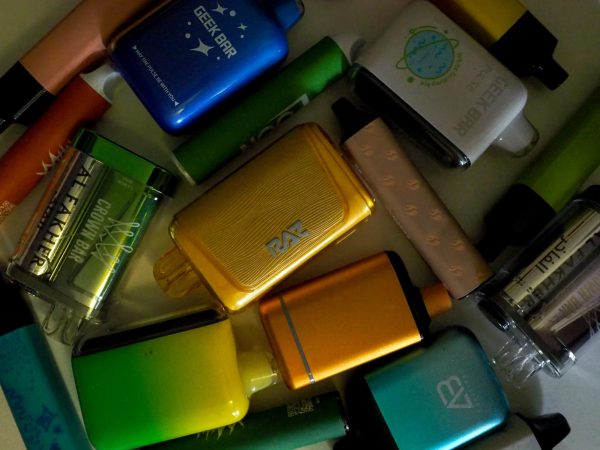SGA has new President and Vice President
Students elected junior Olivia Eisenberg and sophomore Carter Purple as President and Vice President of SGA, respectively, in elections held March 29-31, according to the SGA website.
In their terms, which will last through April 2024, the duo hope to increase student engagement with SGA and act as strong advocates for the student body, they said.
“Making sure that we’re advocating for students in everything that we do is gonna be really important,” Purple said.
Eisenberg previously served as Chair of the Committee on Legislative and Community Affairs, which also made her co-chair of the Burlington Community Coalition, she said. Her work focused on connecting students to the community with events such as advocating for state legislation and organizing clothing drives.
Some of her past independent projects include placing menstrual products in bathrooms across campus and organizing SGA’s initiatives for Sexual Violence Awareness Month in April 2022, she said.
Eisenberg’s previous work familiarized her with voices in the community and gave her more awareness of what happens around campus, she said.
“It helped me meet a lot of people around Burlington. I think that is definitely really helpful as I think about the projects that I want to do, and the perspectives that I want to continue to listen to,” she said.
Eisenberg feels excited to take on this role and see what her and the Senate accomplish this year, she said.
“When I was first sworn into [the] Senate, and I saw the two people sitting at the front of the room who were president [and] vice president, I don’t think I pictured myself taking on this type of role,” she said. “And so I’m proud of myself for knowing that I’m capable of it.”
One of Eisenberg’s main goals is to ensure that the Senate’s projects are completely student-centered, she said. She plans to use the SGA Strategic Plan, which will serve as a report of student concerns, to do this.
The plan will be completed by mid-October, and it will use an ongoing student survey administered by SGA in order to quantify student concern and focus SGA’s work, she said.
“For example, if 82% of people say that dining is a problem, that’s probably something that we should have a couple of senators working on,” she said.
The plan will also provide concrete information and data to present to the UVM administration, she said.
Eisenberg believes the Strategic Plan will also hold SGA accountable, she said. Students will be able to reference previous plans to evaluate SGA’s actions on the issues in them.
She hopes this and other measures, such as using social media, will help SGA achieve greater transparency and more of an established presence, she said.
Eisenberg strives to build on the previous SGA leadership’s efforts to create strong working relationships with the UVM administration and be strong advocates for students, she said.
Purple previously served as Speaker of the SGA Senate, where his work focused on keeping Senate meetings organized and on task, he said.
His responsibilities involved scheduling public forum speakers, keeping track of legislation and organizing minutes, which ensured productive and organized meetings, he said.
Purple’s previous work taught him organization skills that will contribute to his new role, he said.
Purple sees his role as Vice President as one where he can help senators with their projects, he said. He wants to be there to support them whenever they have an issue or need assistance with a project.
As Vice President, Purple hopes to alleviate issues stemming from over-enrollment, such as housing and staffing shortages, as well as classes filling up quickly, he said.
“President Eisenberg and I both still live in triples on campus,” he said. “So we know what’s going on. We see some of the issues.”
Purple believes transparency is key to help reduce the stress of situations such as forced triples, he said. He believes student awareness of situations like this would ease the frustration.
In terms of housing, Purple hopes to become involved with members of the Burlington City Council to discuss projects such as the Trinity development, he said.
To help achieve his goals, Purple is ready to have difficult conversations with UVM administrators, he said. He believes this is the most important step to determining how to achieve these goals.
“We’re going [into] our third year as senators and each year we’ve gotten better and better at being able to have those difficult conversations,” Purple said. “So I think just making sure that we’re advocating for students in everything that we do is gonna be really important.”
Both Purple and Eisenberg hope to engage the student body in the work of SGA more closely, they said. They hope to plan more community events to help increase student recognition of SGA’s activities.
“I think by doing events that at the very least puts a name to a face in terms of people on SGA and [students] say ‘okay, this is something that SGA is doing,’” Purple said. “And the hope is that way we can increase student engagement in terms of what we do.”
Eisenberg feels many students would not be comfortable coming up to her or Purple’s office to express their concerns, which could be changed with more awareness of SGA’s work, she said.
“The goal is to create more of a presence with these events, so that we can spark conversations from there and just, in general, have more awareness around SGA,” Eisenberg said.
Purple and Eisenberg both said they are happy to talk to students about any ideas or concerns they have.









